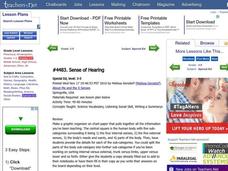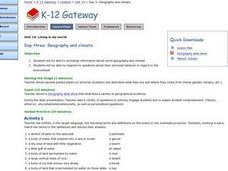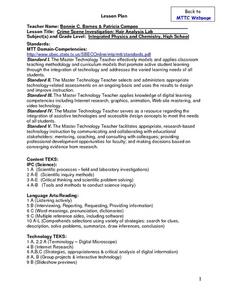Curated OER
Monitoring an Epidemic: Analyzing Through Graphical Displays Factors Relating to the Spread of HIV/AIDS
Tenth graders differentiate pandemic and epidemic. In this health science lesson, 10th graders analyze how HIV and AIDS affect different countries. They construct and interpret different types of graphs.
Perkins School for the Blind
Human Body Regulation
The human body can regulate itself through sweating and resting. Learners with visual impairments discuss how the body changes when it is under stress and what it does to regulate itself. To start, kids use talking thermometers to take...
Curated OER
The Use Of Satellites
Students use the Internet to do research. They organize information and make a presentation on a satellite to the class. They discuss the capability of the leading edge of technology for a given time.
Curated OER
Sense of Hearing
Create a graphic organizer to review parts and systems of the body, then present a new topic. Special education students grades 3-5 learn about the sense of hearing. They draw parts of the ear, sign a song, read Perk Up Your Ears, and...
Curated OER
Geography and Climate
Students investigate geographical locations and their own personal experiences with the environment. In this environmental identification lesson, students participate in a match game using certain environmental and geographical...
Curated OER
"Zoophyla"
Ninth graders gain an understanding of organims based on charateristics. They study about Kingdom Animalia and use technology to present knowledge of phyla. Finally, they create a new animal species of their own. When others present,...
Curated OER
Crime Scene Investigation: Hair Analysis Lab
Students participate in a hair analysis lab. Using a digital microscope, students compare and contrast hair samples. They determine if the hair samples are human or animal. After completing lab results sheets, students share their...






